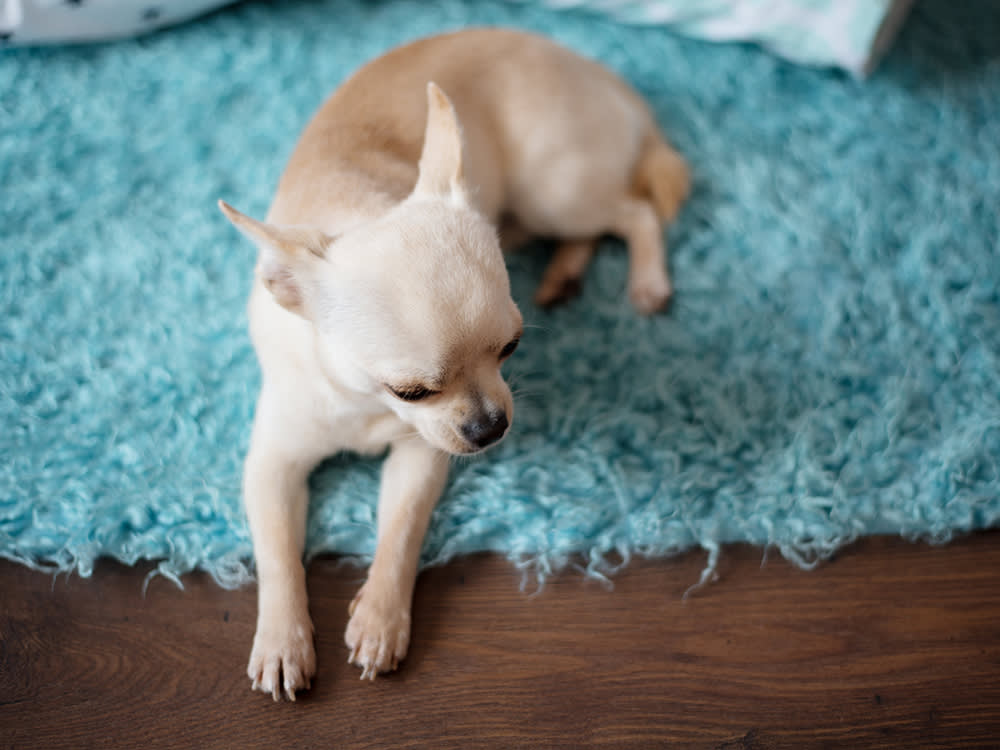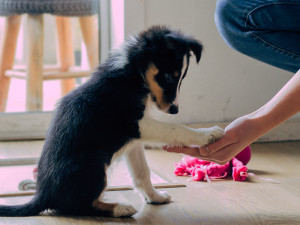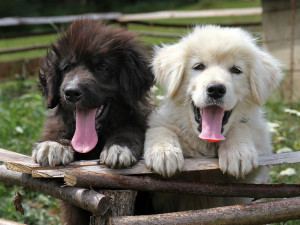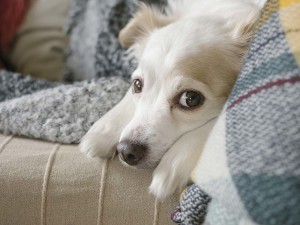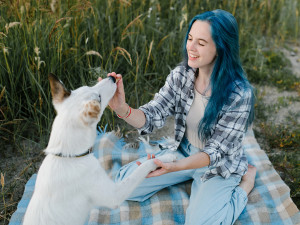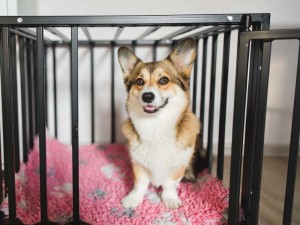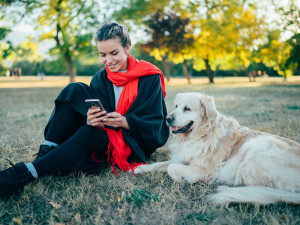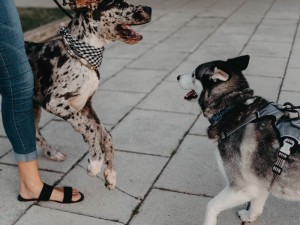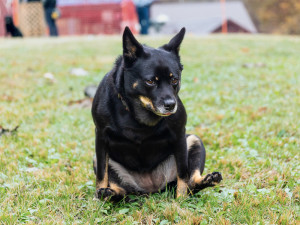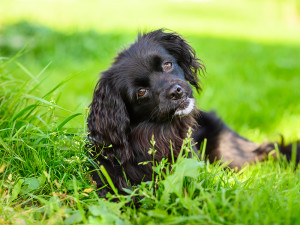In this article:
Causes of adult dogs peeing in the house How to housetrain a dog
Adult dogs may start peeing in the house for a variety of reasons, including health issues that must be addressed before the behaviour can change. If medical causes are ruled out, potential emotional factors, such as grief or anxiety, should be considered. When house training a dog, including an adult dog who needs a refresher course, temporarily restrict the areas they can access, closely supervise them, and ensure you thoroughly and properly clean up after accidents.
It is very unsettling to suddenly realise that an adult dog seems to have lost the excellent housetraining skills you’ve taken for granted for years, and it can make anyone feel frantic to learn how to stop grown dogs from peeing in the house. Adult dogs don’t start peeing in the house for no reason, and figuring out the reason is an essential part of the solution.
Potential causes for adult dogs peeing in the house
Urinary tract infections
In many cases, an adult dog suddenly peeing in the house is a result of a medical issue, so it’s essential to consult with your veterinarian. A common cause of an adult dog peeing a lot, and therefore going in the house, is a urinary tract infection (UTIs).
UTIs are more common in females than in males, which is why this health issue is one of the usual suspects when the question is, “Why is my female dog suddenly peeing in the house?”
Health problems
Other health issues that lead to an adult dog suddenly peeing in the house are kidney disease, a tumour, problems after being spayed (which can start to be a problem right away or even years later), separation anxiety and diabetes.
Some medications make dogs extra thirsty, causing them to drink so much water they can’t hold it as long, so they go in the house. If your adult dog has started a new medication, is suddenly peeing in the house, and you are also wondering why your dog is peeing so much, schedule a visit with the vet.
Age
Age can be a factor; it’s not unusual for older dogs to wee in the house, even though they never used to. Some dogs leak urine because their sphincter no longer has the strength to fully close and keep urine in. This is more common in older dogs but can affect dogs of other ages, too.
Dogs with painful arthritis, again more common in older dogs but not confined to those in their golden years, sometimes struggle to get up in time to make it to the potty, causing them to pee in the house. Many older dogs simply have to relieve themselves more often. If this is the issue, more frequent trips outside may stop an old dog from peeing in the house.
Behaviour issues
On the behavioural side, there are many reasons why adult dogs may suddenly start to wee in the house. In some cases, a dog is not really house trained, but their parent has been encouraging them to go out to wee on a regular schedule, and if the routine changes, the dog may wee inside. There are dogs who resist going outside in bad weather and end up peeing inside instead.
These unfortunate conditions can include extreme cold, high winds, rain or snow. Sometimes, dogs become afraid of the garden or of peeing out there for some reason, causing them to wee inside instead. Fears can result from being outside when there’s a huge clap of thunder, stepping on something painful such as a thorn, a bee that stings them or a person scaring them while they are out there. If the dog happens to be peeing when the scary thing happens, the dog may be comfortable in the garden in general but afraid to wee outside.
How to housetrain a dog
1. Clean thoroughly
How you clean up after an accident is important. What matters most is removing the odour that acts like a neon sign flashing the words ‘wee here!’ Household cleaners may smell fresh and clean to humans, but not to dogs. Many contain ammonia, and ammonia gives off an odour that attracts dogs as if it were urine. Use an enzymatic cleaner designed to chemically neutralise the urine instead. Baking soda can do this too, though not as effectively.
2. Temporarily give less freedom in the house
Dogs are less likely to eliminate in areas in which they spend time, so keep your dog in just one or two rooms for a while. Spending time in those areas will increase the likelihood that he won’t want to wee in them. But don’t isolate him; choose the rooms that you also spend the most time in. The idea is to make those rooms his home, and that won’t work as well if you’re not there, too.
With the scent of the whole family all around, he’s more likely to want to keep that area clean. With success, add rooms to his ‘home area’. Being on the floor with him will add your scent, which also makes it easier for him to grasp that these areas are out of bounds for elimination.
3. Go back to housetraining 101
While your dog is relearning his housetraining skills, it is important that they pee in one of only three situations:
Outside with you
If they’re outside, they have the opportunity to wee in the proper place. Because you’re with them, you’ll know if they’ve actually gone or just sniffed around, watched the birds or chewed on a toy. If they do go for a wee, you’re right there to reinforce them with a treat, so they learn they’ve done the right thing.
Inside, under your constant supervision
Watching a dog every second for signs they need to go out is a lot of work, but it’s the best way to be alerted to their needs. Many dogs circle, sniff, head to the back door, pace, whine, head to an area they have peed in before, seem distracted or refuse a favourite treat or toy when they need to go for a wee.
If your dog lets you know when they need to go out when you’re home, this may not be necessary. However, it’s also possible they’ve gone in the house while you were home, but you didn’t notice right away and assumed it happened when you were out. I’ve heard this many times from people who didn’t realise their dogs had peed inside until they started keeping a closer eye on them.
Confined in a small area when you are not around
When you can’t watch them, confine them to a small space, where they’re unlikely to make a mess. A crate, the utility room or a bathroom – any place they’re comfortable – are all options. Many dogs don’t like to be in peed-in places and are less likely to wee in a small space, especially if they sleep or rest there regularly. This doesn’t mean a dog who can’t hold it any longer or a dog who is peeing in the house because of stress will hold it, but it can encourage many dogs to do so for at least a while longer. Additionally, if a dog does go for a wee in this area, clean-up is at least confined to a spot that is (ideally) easier to clean than other areas of the house.
In the early stages of house training a dog, you should not put your dog in any other situation. Once your dog has progressed and is better at peeing only where you want them to, you can consider relaxing these rules.
Final pieces of advice: do not, under any circumstance, punish your dog for peeing inside the house. That can be scary and distressing and can damage both your relationship and the house training progress itself. Be patient. Remember, your dog is struggling and deserves your support, comfort and assistance. They may be as upset about the peeing in the house as you are, or may be one of those dogs who is tricky to train.
Frequently asked questions
Are there products that can help stop urination in the house?
Enzymatic cleaners prevent the house from smelling like the bathroom, which can help stop urination indoors. Indoor puppy pads can prevent cleaning hassles.
Why does my dog keep peeing in the same spot inside?
Dogs often pee in spots that smell like urine, so if you don’t use an enzymatic cleaner to remove the odour, they will consider it the place to go for a wee.
What are the reasons my female dog started peeing in the house?
Both males and females can develop health issues such as urinary tract infections, kidney disease or tumours, but female dogs can also suffer incontinence due to being spayed, though the issue may show up years after the procedure.
